中英心理对照
心理学专业名词中英文对照
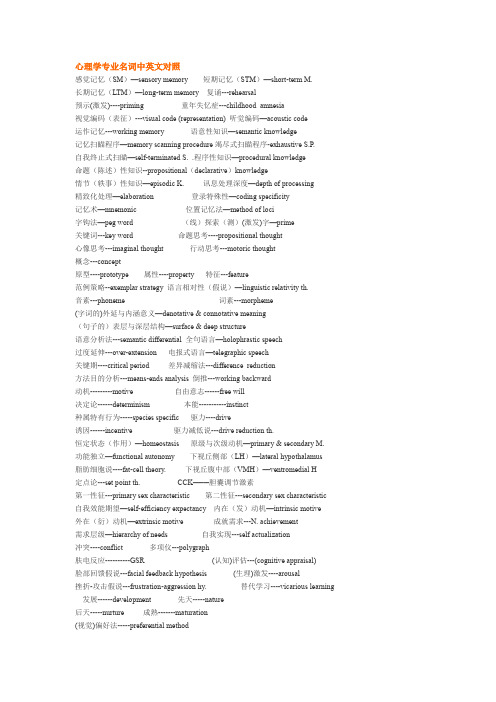
心理学专业名词中英文对照感觉记忆(SM)—sensory memory 短期记忆(STM)—short-term M.长期记忆(LTM)—long-term memory 复诵---rehearsal预示(激发)----priming 童年失忆症---childhood amnesia视觉编码(表征)---visual code (representation) 听觉编码—acoustic code运作记忆---working memory 语意性知识—semantic knowledge记忆扫瞄程序—memory scanning procedure竭尽式扫瞄程序-exhaustive S.P.自我终止式扫瞄—self-terminated S. .程序性知识—procedural knowledge命题(陈述)性知识--propositional(declarative)knowledge情节(轶事)性知识—episodic K. 讯息处理深度—depth of processing精致化处理—elaboration 登录特殊性—coding specificity记忆术—mnemonic 位置记忆法—method of loci字钩法—peg word (线)探索(测)(激发)字—prime关键词---key word 命题思考----propositional thought心像思考---imaginal thought 行动思考---motoric thought概念---concept原型----prototype 属性----property 特征---feature范例策略--exemplar strategy 语言相对性(假说)—linguistic relativity th.音素---phoneme 词素---morpheme(字词的)外延与内涵意义—denotative & connotative meaning(句子的)表层与深层结构—surface & deep structure语意分析法---semantic differential 全句语言—holophrastic speech过度延伸---over-extension 电报式语言—telegraphic speech关键期----critical period 差异减缩法---difference reduction方法目的分析---means-ends analysis 倒推---working backward动机---------motive 自由意志------free will决定论------determinism 本能-----------instinct种属特有行为-----species specific 驱力----drive诱因------incentive 驱力减低说---drive reduction th.恒定状态(作用)—homeostasis 原级与次级动机—primary & secondary M.功能独立—functional autonomy 下视丘侧部(LH)—lateral hypothalamus脂肪细胞说----fat-cell theory. 下视丘腹中部(VMH)—ventromedial H定点论---set point th. CCK───胆囊调节激素第一性征---primary sex characteristic第二性征---secondary sex characteristic自我效能期望—self-efficiency expectancy内在(发)动机—intrinsic motive外在(衍)动机—extrinsic motive成就需求---N. achievement需求层级—hierarchy of needs 自我实现---self actualization冲突----conflict 多项仪---polygraph肤电反应----------GSR (认知)评估---(cognitive appraisal)脸部回馈假说---facial feedback hypothesis (生理)激发----arousal挫折-攻击假说---frustration-aggression hy. 替代学习----vicarious learning 发展------development 先天-----nature后天-----nurture 成熟-------maturation(视觉)偏好法-----preferential method习惯法-----habituation 视觉悬崖-----visual cliff剥夺或丰富(环境)---deprivation or enrichment of env. 基模----schema同化----assimilation 调适-----accommodation 平衡----equilibrium 感觉动作期----sensorimotor stage 物体永久性----objective permanence运思前期----preoperational st. 保留概念----conservation道德现实主义---moral realism 具体运思期-----concrete operational形式运思期----formal operational st. 前俗例道德---pre-conventional moral俗例道德----conventional moral 超俗例道德----post-conventional moral气质----temperament 依附---attachment 性别认定---gender identity性别配合----sex typing 性蕾期---phallic stage 恋亲冲突—Oedipal conflict认同-----identification 社会学习----social learning 情结---complex性别恒定----gender constancy 青年期----adolescence 青春期-- -puberty第二性征---secondary sex characteristics 认同危机---identity crisis定向统合---identity achievement 早闭型统合---foreclosure未定型统合---moratorium 迷失型统合---identity diffusion传承---generativity心理动力------psycho-dynamics 心理分析------psychoanalysis行为论-------behaviorism 心理生物观---psycho-biological perspective 认知---------cognition 临床心理学家-clinical psychologist谘商--------counseling 人因工程-------human factor engineering组织--------organization 潜意识---------unconsciousness完形心理学---Gestalt psychology 感觉------------sensation知觉--------perception 实验法--------experimental method独变项-------independent variable 依变项--------dependent V.控制变项------control V. 生理------------physiology条件化---------conditioning 学习------------learning比较心理学---comparative psy. 发展-------------development社会心理学---social psy. 人格--------------personality心理计量学—psychometrics 受试(者)---------subject实验者预期效应—experimenter expectancy effect双盲法-----double—blind 实地实验--------field experiment相关-----------correlation 调查-------------survey访谈-----------interview 个案研究-------case study观察-----------observation 心理测验-------psychological test纹理递变度-----texture gradient 注意------------attention物体的组群---grouping of object 型态辨识—pattern recognition形象-背景----figure-ground 接近律--------proximity相似律--------similarity 闭合律-------closure连续律--------continuity 对称律-------symmetry错觉-----------illusion 幻觉----------delusion恒常性--------constancy 大小----------size形状-----------shape 位置---------- location单眼线索-----monocular cue 线性透视----linear- perspective双眼线索-----binocular cue 深度---------depth调节作用-----accommodation 重迭----superposition双眼融合-----binocular fusion 辐辏作用-----convergence双眼像差-----binocular disparity 向度--------- dimension自动效应-----autokinetic effect 运动视差----- motion parallax诱发运动---- induced motion 闪光运动----- stroboscopic motion上下文﹑脉络-context 人工智能------artificial intelligence A.I.脉络关系作用-context effect 模板匹配------template matching整合分析法---analysis-by-synthesis 丰富性---------redundancy选择性---------selective 无意识的推论-unconscious inferences运动后效---motion aftereffect 特征侦测器—feature detector激发性---excitatory 抑制性----inhibitory几何子---geons 由上而下处理—up-down process由下而上处理---bottom-up process 连结者模式---connectionist model联结失识症---associative agnosia 脸孔辨识困难症---prosopagnosia意识--conscious(ness)意识改变状态---altered states of consciousness无意识----unconsciousness 前意识---------preconsciousness内省法---introspection 边缘注意---peripheral attention多重人格-----multiple personality午餐排队(鸡尾酒会)效应—lunch line(cocktail party) effect自动化历程----automatic process解离----dissociate 解离认同失常----dissociative identity disorder 快速眼动睡眠----REM dream非快速眼动睡眠—NREM dream神志清醒的梦----lucid dreaming 失眠---insomnia显性与隐性梦---manifest & latern content 心理活动性psychoactive冥想------meditation 抗药性---- tolerance 戒断----withdrawal感觉剥夺---sensory deprivation 物质滥用----substance abuse成瘾--------physical addiction 物质依赖----sub. dependence戒断症状----withdrawal symptom 兴奋剂--stimulant幻觉(迷幻)剂----hallucinogen 镇定剂---sedative﹐抑制剂--depressant 酒精中毒引起谵妄—delirium tremens麻醉剂---narcotic 催眠-------hypnosis催眠后暗示----posthypnotic suggestion 催眠后失忆 posthypnotic amnesia超心理学---parapsychology 超感知觉extrasensory perception ESP心电感应---telepathy 超感视---clairvoyance 预知---precognition心理动力—psycokinesis PK 受纳器-----receptor 绝对阈----absolute threshold 差异阈----------difference threshold 恰辨差------- -JND韦伯律---------Weber's law 心理物理-----psychophysical费雪纳定律---Fechner's law频率-----frequency振幅----------amplitude 音频-------pitch基音----------fundamental tone 倍音-----overtone和谐音-------harmonic 音色------timbre白色噪音----white noise 鼓膜-----eardrum耳蜗----------cochlea 卵形窗—oval window圆形窗-------round window 前庭-----vestibular sacs半规管-------semicircular canals 角膜-------cornea水晶体-------lens 虹膜------------iris瞳孔----------pupil 网膜---------retina睫状肌-------ciliary muscle 调节作用---accommodation脊髓---------spinal cord 反射弧--------reflex arc脑干---------brain stem 计算机轴性线断层扫描-- CA T 或CTPET---正子放射断层摄影 MRI-----磁共振显影延脑----medulla 桥脑-----pons 小脑----cerebellum网状结构---reticular formation RAS----网状活化系统视丘----thalamus 下视丘----hypothalamus大脑----cerebrum 脑(下)垂体(腺)—pituitary gland脑半球---cerebral hemisphere 皮质---cortex胼胝体----corpus callosum 边缘系统------limbic system海马体----hippocampus 杏仁核--------amygdala中央沟---central fissure 侧沟-----------lateral fissure脑叶------lobe 同卵双生子----identical twins异卵双生子—fraternal twins古典制约--classical conditioning 操作制约---operant conditioning非制约刺激—(US unconditioned stimulus非制约反应—(UR)unconditioned R. 制约刺激---(CS) conditioned S. 制约反应----(CR)conditioned R.习(获)得-----acquisition 增强作用------reinforcement消除(弱)------extinction 自(发性)然恢复----spontaneous recovery前行制约—forward conditioning 同时制约--simultaneous conditioning回溯制约---backward cond. 痕迹制约——trace conditioning延宕制约—delay conditioning 类化(梯度)---generalization (gradient)区辨------discrimination (次级)增强物-------(secondary) reinforcer嫌恶刺激---aversive stimulus 试误学习---trial and error learning效果率-----law of effect 正(负)性增强物—positive (negative) rei.行为塑造—behavior shaping 循序渐进-----successive approximation自行塑造—autoshaping 部分(连续)增强—partial (continuous)R定比(时)时制—fixed ratio (interval) schedule FR或FI变化比率(时距)时制—variable ratio (interval) schedule VR或VI逃离反应---escape R. 回避反应—avoidance response习得无助----learned helplessness 顿悟--------insight学习心向—learning set 隐内(潜在)学习---latent learning认知地图---cognitive map 生理回馈------biofeedback敏感递减法-systematic desensitization 普里迈克原则—Premack's principle洪水法----flooding 观察学习----observational learning动物行为学----ethology 敏感化—sensitization习惯化---habituation 联结---association认知学习----cognitional L. 观察学习---observational L.登录﹑编码----encoding 保留﹑储存-----retention提取------retrieval 回忆----(free recall全现心像﹑照相式记忆---eidetic imagery﹑photographic memory.舌尖现象(TOT)—tip of tongue 再认---------recognition再学习--------relearning 节省分数----savings外显与内隐记忆--explicit & implicit memory 记忆广度---memory span组集--chunk 序列位置效应---serial position effect起始效应---primacy effect 新近效应-----recency effect心(情)境依赖学习---state-dependent L. 无意义音节—nonsense syllable顺向干扰---proactive interference 逆向干扰---retroactive interference闪光灯记忆---flashbulb memory 动机性遗忘----motivated forgetting器质性失忆症—organic amnesia 阿兹海默症---Alzheimer"s disease近事(顺向)失忆症—anterograde amnesia旧事(逆向)失忆—retrograde A. 高沙可夫症候群—korsakoff"s syndrome 凝固理论—consolidation th.。
英语通识阅读教程 心理篇在线阅读中英文对照

英语通识阅读教程心理篇在线阅读中英文对
照
人类心理是一个复杂而有趣的领域,心理学作为一门学科,帮助我们更好地理解自己和他人。
而在英语通识阅读教程中,心理篇更是为我们揭开了心灵的奥秘。
通过阅读这些内容,我们可以深入了解心理学的基本概念和原理,从而更好地认识自己和他人。
在阅读英语通识阅读教程中的心理篇时,我们可以了解到各种心理现象和心理学理论。
比如,我们可以了解到人们在面对挑战时可能会出现的焦虑情绪,以及如何通过心理调节来应对这种情绪。
同时,我们也可以了解到人们在做决策时可能会受到各种认知偏差的影响,从而在做出决策时采取更加理性的方式。
通过阅读英语通识阅读教程中的心理篇,我们还可以了解到人们在社交互动中可能会出现的各种心理现象。
比如,我们可以了解到人们在群体中可能会出现的从众效应,以及如何在这种情况下保持自己的独立思考。
同时,我们也可以了解到人们在与他人交流时可能会出现的非言语交流现象,从而更好地理解他人的情绪和意图。
通过阅读英语通识阅读教程中的心理篇,我们可以不仅仅了解到心理学的基本原理,还可以学会如何运用这些知识来改善自己的生活。
比如,我们可以通过理解自己的情绪和行为模式,来更好地管理自己的情绪和行为。
同时,我们也可以通过理解他人的情绪和行为模式,来更好地与他人沟通和交流。
总的来说,通过阅读英语通识阅读教程中的心理篇,我们可以更加深入地了解心理学的知识,从而更好地认识自己和他人。
同时,我们还可以学会如何运用这些知识来改善自己的生活,提高自己的情商和人际关系能力。
希望大家都能够通过阅读心理篇,不断提升自己的心理素养,迎接更加美好的未来。
心理学专业名词中英文对照
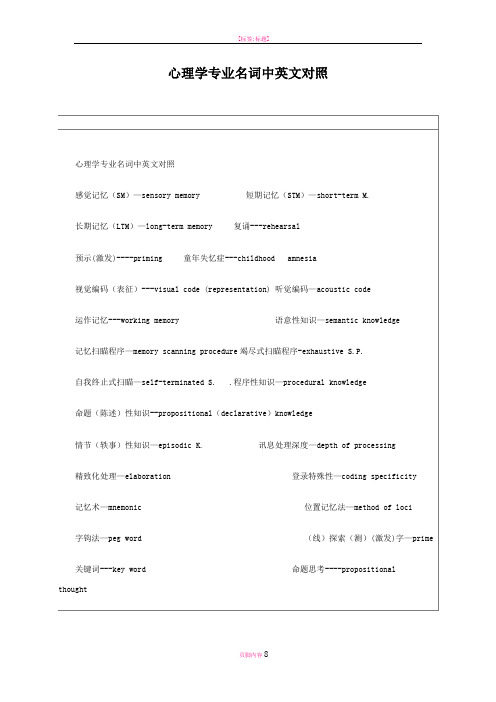
感觉动作期----sensorimotor stage 物永久性----objective permanence
运思前期----preoperational st. 保留概念----conservation
心理学专业名词中英文对照
心理学专业名词中英文对照
感觉记忆(SM)—sensory memory 短期记忆(STM)—short-term M.
长期记忆(LTM)—long-term memory 复诵---rehearsal
预示(激发)----priming 童年失忆症---childhood amnesia
发展------development 先天-----nature
后天-----nurture 成熟-------maturation
(视觉)偏好法-----preferential method
习惯法-----habituation 视觉悬崖-----visual cliff
剥夺或丰富(环境)---deprivation or enrichment of env. 基模----schema
概念---concept
原型----prototype 属性----property 特征---feature
范例策略--exemplar strategy 语言相对性(假说)—linguistic relativity th.
音素---phoneme 词素---morpheme
(字词的)外延与内涵意义—denotative & connotative meaning
气质----temperament 依附---attachment 性别认定---gender identity
心理契约中英文对照外文翻译文献

心理契约中英文对照外文翻译文献(文档含英文原文和中文翻译)A Psychological Contract Perspective on Organizational Citizenship BehaviorJacqueline A-M. Coyle-ShapiroIndustrial RelationsLondon School of Economics and Political ScienceAbstractThis study examined the contribution of the psychological contract framework to understanding organizational citizenship behavior (OCB) using survey data gathered at three measurement points over a three year period from 480 public sector employees. Separating perceived contract breach into its two components, the data suggest that perceived employer obligations explained unique variance in three dimensions of citizenship behavior (helping, advocacy and functional participation) beyond that accounted for by perceived employer inducements. Employees’ acceptance of the norm of reciprocity moderated the relationship between employer inducements and the dimensions of advocacy and functional participation. Employees’ trust in their employer moderated the relationship betwe en perceived employer obligations and the dimensions of advocacy and functional participation. Contrary to the hypothesis, procedural or interactional justice were not found to moderate the relationship between the psychological contract and OCB. The implications of the findings for psychological contract research are discussed.IntroductionIn the past decade, a good deal of research has been conducted on employee responses to psychological contract breach. When an employee perceives that his/her employer has failed to fulfill one or more promised obligations, he/she is likely to reciprocate in a number of ways. As such, existing empirical research demonstrates that contract breach is related to lower employer trust (Robinson, 1996), job satisfaction (Robinson & Rousseau, 1994), organizational commitment (Coyle-Shapiro & Kessler, 2000), intentions to remain (Turnley & Feldman, 1999) in-role and extra-role performance (Robinson, 1996; Robinson & Morrison, 1995).The Psychological Contract is a powerful deciding factor of organizational behavior,andnecessary in the maintenance of Psychological Contract violation on the behavior of employees under the context of chinese culture has important significance.In the dynamic development of Psychological Contract,employees will have two important subjective perceptions:Psychological Contract Violation and Perceived Organization Support .there are mutual influences between them;the increasing Perceived Organizational Support can effectively inhibit Psychological Contract Violation,which is positively significant in human resources management practice.Perceived contract breach results in a sense of discrepancy between what is promised and what is fulfilled. This perceived discrepancy leads to unmet expectations, a loss of trust (Robinson, 1996) and job dissatisfaction (Turnley & Feldman, 2000), which in turn negatively affects employee contributions. It is the perception of a discrepancy that is the motivational mechanism underlying much of this research. It seems, therefore, that the role of promises (i.e. perceived obligations) is limited to providing the baseline to which an individual compares what they have received. However, perceived obligations may exert an important influence on employee behavior for the following reason: promises made represent potential future inducements that an employee may or may not receive in the course of their relationship with the employer. Whether these potential inducements are realized is contingent upon how the employee behaves in that relationship. Consequently, employees should be motivated to behave in a manner that increases the likelihood of those promises being fulfilled.The primary purpose of this research is to gain a better understanding of how psychological contracts affect employee behavior. Specifically, this study hopes to advance prior research in two ways. First, this study examines the concurrent effects of perceived employer obligations and inducements on employees’ reported organizational citizenship behavior (OCB). By separating the components of contract breach, this permits an examination of the unique feature of the psychological contract; that is, its focus on obligations. If perceived employer obligations and inducements have independent effects on OCB, this would provide preliminary support for the view that the psychological contract is distinctive in capturing present as well as anticipated inducements. A second aim of this study is to examine whether differences exist between perceived employer obligations and inducements in terms of their relationship with OCB. This is accomplished by investigating the moderating role of employees’ acceptance of the norm of reciprocity, procedural and interactional justice and trust in the employer in the relationship between the components of breach and OCB.Exchange ModelsThe exchange model proposed by Barnard (1938) and later revised by March and Simon (1958) posited that individuals exchange their contributions forcertain inducements that the organization provides.Subsequently, Blau (1964) distinguished between social and economic exchange that differ among other things on the nature of the inducements being offered by the organization; economic exchange emphasizes the financial and more tangible aspects of the exchange while social exchange emphasizes the socio-emotional aspects of the exchange (Shore, Tetrick, Lynch & Barksdale, 2002). Central to social exchange theory is the norm of reciprocity (Gouldner, 1960) that obligates individuals to respond positively to favorable treatment received from others (Blau, 1964). A common feature of these exchange models is their exclusive focus on the inducements provided in the relationship. Gould (1979) argues that a limitation of these frameworks is that they fail to consider the impact of employee expectations for future organizational outcomes. Consequently, Gould (1979) recommends that research attention should be directed towards operationalizing future anticipated rewards that an employee may receive in the course of his/her exchange relationship with the employer. The psychological contract framework seems appropriate as it captures perceived employer obligations (anticipated inducements) alongside present inducements.This extended focus, in theory, differentiates the psychological contract from inducement based exchange models.Psychological ContractsCritics of the psychological contract framework may well argue that contract breach is not distinctive from other exchange related constructs that capture how well or fairly employees feel their employer treats them. Guest (1998) suggests that there may be potential conceptual overlap between social exchange theory and the psychological contract that may bring into question the “added value” of the psychological co ntract construct. Along similar lines from a methodological stance, Arnold (1996) argues that contract breach combines two elements: obligations and fulfillment of obligations and hence, it may be one of the elements that is significant in explaining the outcomes. If this is the case, the conceptual overlap between the psychological contract and related constructs may become problematic in that a distinctive feature of the psychological contract (i.e. promissory obligations) becomes illusory. Consequently, it is important to empirically examine the added contribution of perceived employer obligations to understanding employee behavior.Psychological Contract Violation has an important impact on employees' Organzation Commitment and Organizational Citizenship Behavior.The results show that :in the context of Chinese culture,the Psychological Contract Violation of employees negatively correlated withOrganizational Citizenship Behavior of employees.Psychological Contract Violation of employees is a good predictor of their Organization Commitment and Organization Citizenship Behavior;we can see from this,employees'Psychological Contract Violation impacts enterprises.On one hand Psychological Contract Violation would result in lower Organization Commitment,which not conducive to stability;on the other hand Psychological Contract Violation would cause reduction of Organizational Citizenship Behavior expected,which is not conducive to business performance improvement.All this will impact long term development of enterprises.Perceived Organizational Support is another important subjective perception,it is a series of employees' convictions about how great importance the organizations attach to the contribution and the overall well-being of employees.The increasing Perceived Organizational Support can effectively inhibit Psychological Contract Violation and reduce its negative effectively inhibit Psychological Contract Violation and reduce its negative effects.Research confirms that perceived Organizational Support mediates the relationship between Psychological Contract Violation and its outcomes:Organization Commitment and Organizational Citizenship Behavior of the employees,which is significant,in the case of violation of the Psychological Contract,enterprises can take effective measures to increase their Perceived Organizational Support,and intervene Psychological Contract Violation to reduce or adverse effects.The organizationThe research was carried out in a local authority in the South East of England.Centered on a relatively affluent part of the country, the authority was responsible for the provision of a wide range of public services including education, social services, highways maintenance, home care for the elderly and fire fighting. Following a period of political and financial stability and indeed relative economic well being throughout the 1980s, the authority was subject to a range of pressures and difficulties in the succeeding decade.The authority’s response to these combined pressures saw a fairly radical change in the general structure and operation of the council as well as in the more specific management of employment relationship.MethodologyProcedure and sample The data used here are part of a broader study on the psychological contract. Participants were surveyed three times over a three-year period. At time 1, 21,000surveys were mailed and 6,900 respondents returned completed surveys.MeasuresPerceived employer obligations. These nine items tapped typical aspects of the employment relationship investigated in previous research (Rousseau, 1990) and included long term job security, good career prospects, interesting work, involvement in decision making, support to learn new skills, pay increases to maintain standard of living, fair pay in comparison to employees doing similar work in other organizations, fair pay for responsibilities in the job and fringe benefits that are comparable to employees doing similar work in other organizations.I substituted the following of Rousseau’s ite ms: high pay and pay based on current level of performance for items relating to fairness of pay and benefits to ensure appropriateness for the public sector. As previous research suggests that some terms of the psychological contract may be of greater importance to specific employees and consequently should be weighted more heavily than others (Robinson, 1996). Consequently, employees were asked to indicate how important they felt it was for the employer to provide the same list of obligations along a 7-p oint scale ranging from ‘not at all important’ to ‘extremely important’. To create an overall measure of perceived employer obligations, I multiplied each individual item by its corresponding importance. Therefore, an item that was highly obligated and of great importance would have greater weighting than an item that was weakly obligated and of less importance.Perceived employer inducements.Norm of reciprocity.Trust in employer.Procedural justice.Organizational citizenship behavior.ResultsFrom table 1, the results support the factorial independence of the constructs. Scale means, standard deviations, reliabilities, and correlations are reported in Table 2. As Table 3 shows, perceived employer inducements were positively related to two dimensions of citizenship behavior; functional participation (β= .10, p<. 05) and loyalty (β= .30, p<. 01) providing some support for hypothesis 1. As Table 4 shows, this was supported for two dimensions of OCB.DiscussionThe results of this study support the contention that the psychological contract is distinctive from other social exchange constructs that focus exclusively on the inducements received in the exchange relationship. Specifically, the anticipation of future inducements is important in explaining employees’ willingness to engage in OCB beyond the motivational influence of present inducements. Second, the difference between perceived obligations and inducements is supported in terms of their respective relationship with OCB; trust in the employer strengthens the relationship between employer obligations and OCB; acceptance of the norm of reciprocity strengthens the relationship between employer inducements and OCB. Finally, the psychological contract framework had a differential effect on the substantive categories of OCB.The motivating effect of perceived employer obligations can be understood if one considers the nature of what is being exchanged in most employment relationships. Some promises made by the employer may be specific and discrete thereby having a clear end point in which a promise is judged to be fulfilled or broken. There is empirical evidence suggesting that managers take into account employees’ citizenship behavior when determining evaluation ratings (Podsakoff et al., 2000), which in turn may affect whether promises made by the employer are fulfilled. Therefore, by engaging in OCB, employees may be increasing the probability that future inducements are forthcoming.The acceptance of the norm of reciprocity that underlies exchange relationships is likely to vary across individuals and influence the contributions they are willing to make in that relationship. On the other hand, an individual’s trust in his/her employer helps strengthen the relationship between future anticipated inducements and proactive reciprocation. Theexistence of trust has been highlighted as central to exchange relationships (Blau, 1964) in terms of how employees interpret and respond to perceived employer behavior (Robinson & Rousseau, 1994; Robinson, 1996). Employees who have greater trust in their employer are more likely to invest in the future of that relationship based on their belief that the employer will continue to maintain the relationship by delivering on future promises.ImplicationsResults of this study highlight the importance of promissory obligations in predicting employees’ citizenship behavior. It is the inclusion of obligations that distinguishes the psychological contract from social exchange constructs that exclusively capture perceived employer treatment without taking into account potential future treatment by the employer. As the psychological contract captures anticipated inducements (e.g. obligations) alongside present inducements, it may provide a more comprehensive basis to examine employee reciprocity in exchange relationships.Therefore, managers need to be careful about what they promise particularly in the context of organizational change when reneging of promises may be more prevalent. Second, managers need to be aware that employees may differ in the extent to which they accept the norm of reciprocity in their exchange relationship with the employer.Strengths and WeaknessesAn important strength of this study is its sample of diverse public sector employees, which remains under-researched from a psychological contract perspective. Another strength of this study is that it provides a complementary motivational base to that provided by contract breach in understanding the consequences of exchange relationships.In addition, the study has a number of methodological limitations. First, all the variables were measured with self-report survey measures.Consequently, the observed relationships may have been artificially inflated as a result of respondents’ tendencies to respond in a consistent manner. However, the measurement of the independent and dependent variables over three measurement occasions reduces the potential for common method bias.Future ResearchIn terms of replication, further studies with different samples should examine the independent consequences of the components of contract breach and hence lend further support to or question the distinctive contribution of psychological contracts in our understanding of the exchange relationship. With respect to extension, additional researchcould explore other hypothesized determinants of proactive or anticipatory reciprocation as well as potential moderating variables in this relationship. The relationship between justice and psychological contracts merits additional examination. Perceptions of justice have been treated as an antecedent of contract violations (Tekleab & Taylor, 2000) and also as an outcome of contract breach/fulfillment (Liao-Troth, 1999). Blader and Tyler (2000) find empirical support for a communal exchange perspective to understanding OCB that may provide a gateway to exploring OCB beyond social exchange.ReferencesAiken, L.S. West, S.G. 1991. Multiple Regression: Testing and Interpreting Interactions.Armeli, S. Eisenberger, R. Fasolo, P. Lynch, P. 1998. Perceived organizational supportand police performance: The moderating influence of socioemotional needs. Journal of AppliedArnold, J. 1996. The psychological contract: A concept in need of closer scrutiny?. European Journal of Work and Organizational Psychology 5: 511-520.Barnard, C.I. 1938. The Functions of the Executive. Harvard University PressBies, R.J. and Moag, J.S. 1986. Interactional justice: Communication criteria for fairness.Blader, S.L. Tyler, T.R. 2000. Beyond reciprocity: the role of relationship orientation in explaining cooperative organizational behavior. In J. Neuman & J. Coyle-Shapiro (Chairs),Employee-Employer Reciprocity: Within and Beyond the Employment Relationship. Symposium conducted at the meeting of the Society for Industrial and Organizational Psychology, New Orleans, Louisiana.Blancero, D.M. Kreiner, G.E 2000. The "anticipatory psychological contract": Employer/employee obligations and job choice. Paper presented at the annual meeting of the Academy of Management, Toronto.Blau, P. 1964. Exchange and power in social life. Wiley: New York.Brockner, J., Dewitt R.L., Grover, S. Reed, T. 1990. When it is especially important to explain why: factors affecting the relation ship between managers’ explanations of a layoff and survivors’ reactions to a layoff. Journal of Experimental Social Psychology, 26: 289-407.Brockner, J. Weisenfeld, B.M. 1996. An integrative framework for explaining reactionsto decisions: Interactive effects of outcomes and procedures. Psychological Bulletin 120摘要本研究以了解使用三个测量点超过480公共部门的雇员在三年期间收集的调查数据组织公民行为(OCB)心理契约框架的贡献。
心理学专业考研重点名词中英文对照表(七)
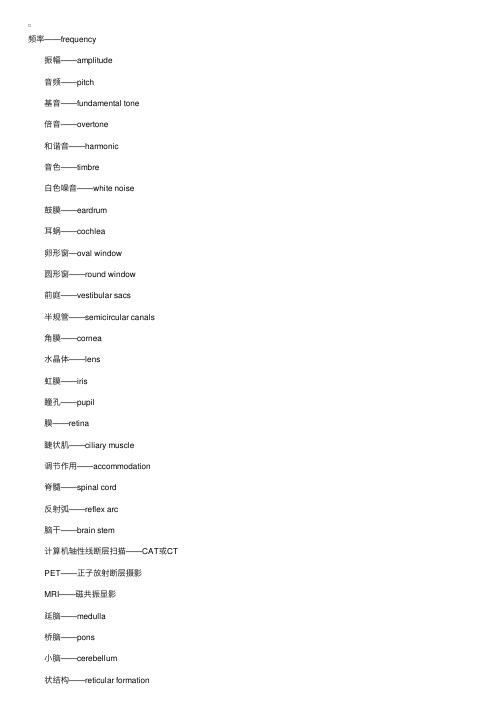
频率——frequency 振幅——amplitude ⾳频——pitch 基⾳——fundamental tone 倍⾳——overtone 和谐⾳——harmonic ⾳⾊——timbre ⽩⾊噪⾳——white noise ⿎膜——eardrum ⽿蜗——cochlea 卵形窗—oval window 圆形窗——round window 前庭——vestibular sacs 半规管——semicircular canals ⾓膜——cornea ⽔晶体——lens 虹膜——iris 瞳孔——pupil 膜——retina 睫状肌——ciliary muscle 调节作⽤——accommodation 脊髓——spinal cord 反射弧——reflex arc 脑⼲——brain stem 计算机轴性线断层扫描——CAT或CT PET——正⼦放射断层摄影 MRI——磁共振显影 延脑——medulla 桥脑——pons ⼩脑——cerebellum 状结构——reticular formation RAS——状活化系统 视丘——thalamus 下视丘——hypothalamus ⼤脑——cerebrum 脑(下)垂体(腺)—pituitary gland 脑半球——cerebral hemisphere ⽪质——cortex 胼胝体——corpus callosum 边缘系统——limbic system 海马体——hippocampus 杏仁核——amygdala 中央沟——central fissure 侧沟——lateral fissure 脑叶——lobe 同卵双⽣⼦——identical twins 异卵双⽣⼦—fraternal twins 古典制约——classical conditioning 操作制约——operant conditioning ⾮制约刺激—(US unconditioned stimulus ⾮制约反应—(UR)unconditioned R. 制约刺激——(CS)conditioned S. 制约反应——(CR)conditioned R. 习(获)得——acquisition 增强作⽤——reinforcement 消除(弱)——extinction ⾃(发性)然恢复——spontaneous recovery 前⾏制约—forward conditioning 同时制约——simultaneous conditioning 回溯制约——backward cond. 痕迹制约——trace conditioning 延宕制约—delay conditioning 类化(梯度)——generalization(gradient) 区辨——discrimination (次级)增强物——(secondary)reinforcer 嫌恶刺激——aversive stimulus 试误学习——trial and error learning 效果率——law of effect 正(负)性增强物—positive(negative)rei. ⾏为塑造—behavior shaping 循序渐进——successive approximation ⾃⾏塑造—autoshaping 部分(连续)增强—partial(continuous)R 定⽐(时)时制—fixed ratio(interval)schedule FR或FI 变化⽐率(时距)时制—variable ratio(interval)schedule VR或VI 逃离反应——escape R. 回避反应—avoidance response 习得⽆助——learned helplessness 顿悟——insight 学习⼼向—learning set 隐内(潜在)学习——latent learning 认知地图——cognitive map ⽣理回馈——biofeedback 敏感递减法-systematic desensitization 普⾥迈克原则—Premack''''s principle 洪⽔法——flooding 观察学习——observational learning 动物⾏为学——ethology 敏感化—sensitization 习惯化——habituation 联结——association 认知学习——cognitional L. 观察学习——observational L. 登录﹑编码——encoding 保留﹑储存——retention 提取——retrieval 回忆——(free recall 全现⼼像﹑照相式记忆——eidetic imagery﹑photographic memory . ⾆尖现象(TOT)—tip of tongue 再认——recognition 再学习——relearning。
英语通识阅读教程 心理篇在线阅读中英文对照
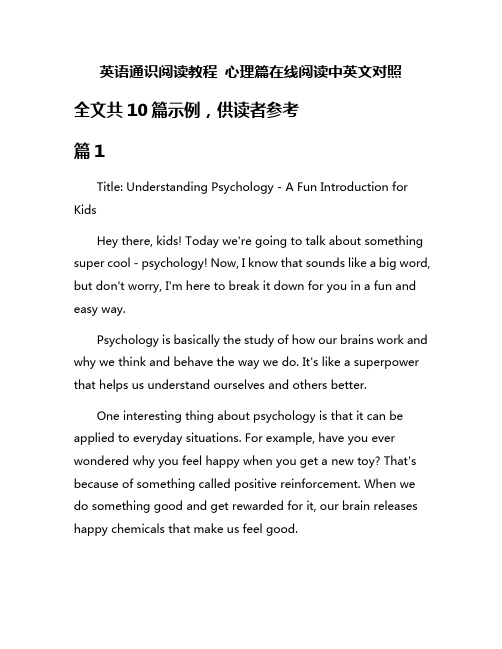
英语通识阅读教程心理篇在线阅读中英文对照全文共10篇示例,供读者参考篇1Title: Understanding Psychology - A Fun Introduction for KidsHey there, kids! Today we're going to talk about something super cool - psychology! Now, I know that sounds like a big word, but don't worry, I'm here to break it down for you in a fun and easy way.Psychology is basically the study of how our brains work and why we think and behave the way we do. It's like a superpower that helps us understand ourselves and others better.One interesting thing about psychology is that it can be applied to everyday situations. For example, have you ever wondered why you feel happy when you get a new toy? That's because of something called positive reinforcement. When we do something good and get rewarded for it, our brain releases happy chemicals that make us feel good.Another cool concept in psychology is empathy. Empathy is when we try to understand how someone else is feeling and show kindness towards them. It's like putting yourself in someone else's shoes and seeing the world from their perspective.Have you ever experienced stage fright before a school play or test? That's because of something called anxiety. Anxiety is a feeling of worry or fear that we all experience from time to time. But don't worry, it's completely normal!Understanding psychology can help us deal with our emotions and behaviors in a healthy way. It can also help us be more compassionate and understanding towards others.So, the next time you're feeling sad, angry, or anxious, remember that it's okay to feel that way. And if you ever need someone to talk to, don't hesitate to reach out to a trusted adult or friend.Psychology is a fascinating field that can teach us so much about ourselves and the world around us. So keep learning and exploring, because the more we understand our minds, the better we can navigate through life's ups and downs.I hope you enjoyed this little introduction to psychology, kids! Remember, it's never too early to start learning about the amazing world of psychology. Stay curious and keep growing!篇2Hello everyone! Today, I'm going to talk about psychology in a super fun and easy way. So, what is psychology? Well, it's the study of the mind and behavior. Crazy, right?Have you ever wondered why we feel happy or sad? That's all psychology, my friends. Our brain is like a super cool computer that controls everything we do. It's like having a little superhero inside our heads!One interesting thing about psychology is how our brains can play tricks on us. Ever heard of optical illusions? They're super cool pictures that make you see things that aren't really there. Our brains are like, "Whoa, what's happening here?"Another cool thing about psychology is emotions. We all feel happy, sad, angry, or scared at times, right? That's totally normal! Our brains are like a rollercoaster of emotions, going up and down all the time.Did you know that psychologists can help people who are feeling sad or anxious? They're like our brain doctors, helping us understand our thoughts and feelings better. It's so important to take care of our mental health, just like we take care of our bodies.So, next time you're feeling a little down, just remember that there's a whole world of psychology out there to help you understand your mind better. Stay curious, my friends! Psychology is super cool and totally mind-blowing.That's all for today's lesson on psychology. I hope you enjoyed it as much as I did! Stay awesome, and keep exploring the wonders of your mind. See you next time! Bye-bye!篇3Title: "All About Feelings"Hey guys! Today I'm gonna talk about feelings. Do you know what feelings are? Well, feelings are the way we react to things that happen around us. Sometimes we feel happy, sometimes sad, and sometimes angry. It's totally normal to have different feelings!When you feel happy, you might laugh, smile, or jump for joy! It feels like sunshine in your heart. When you feel sad, you might cry, feel lonely, or want to be left alone. It's okay to feel sad sometimes. And when you feel angry, you might shout, stomp your feet, or even slam the door. But remember, it's important to find healthy ways to deal with your anger.It's also important to talk about our feelings with others. Sharing your feelings with friends, family, or a teacher can help you feel better. They can give you advice, listen to you, or just give you a hug. Remember, it's okay to ask for help when you need it.Sometimes our feelings can be confusing. We might not understand why we feel a certain way. That's okay! It's important to take some time to think about our feelings and try to figure out why we're feeling that way. It's all part of growing up and learning about ourselves.So, don't be afraid to express your feelings and remember that everyone has different feelings. It's what makes us unique and special! Just be yourself and embrace all your feelings. Smile, laugh, cry, and even get angry. It's all a part of being human.Thanks for listening, guys! Keep exploring your feelings and never be afraid to express them. See you next time!篇4Sure! Here is a sample of the text in a more casual, elementary school student-friendly tone.Title: Understanding the Mind: A Fun Read on PsychologyHey there, pals! Have you ever wondered why people think and act the way they do? Well, that's where psychology comes in! Psychology is the study of the mind and behavior, and it can help us understand ourselves and others better.Let's dive into the world of psychology and learn some cool stuff together! Did you know that our brains have different parts that control different things? For example, the frontal lobe helps us make decisions and solve problems, while the amygdala is in charge of our emotions. It's like having a super smart computer inside our heads!Another interesting thing about psychology is how our experiences and feelings can affect our behavior. Have you ever felt nervous before a test or happy when hanging out with friends? That's because our emotions can impact how we act and react to different situations. It's like having a little mood meter inside us!Psychology also teaches us about the power of our thoughts. Have you ever heard of the saying "mind over matter"? That's the idea that our minds can influence our bodies and our surroundings. By thinking positively and believing in ourselves, we can overcome challenges and achieve great things!As we learn more about psychology, we also discover how unique each person's mind is. Just like how we all have different fingerprints, our thoughts, feelings, and behaviors make usone-of-a-kind. It's pretty cool to think about how each of us is like a special puzzle piece in the big picture of humanity!So, next time you see someone feeling down or acting a little silly, remember that there's a whole world of psychology behind it. By understanding the mind, we can show empathy, compassion, and support to those around us. Let's use our knowledge of psychology to create a kinder and happier world for everyone!Keep exploring, learning, and growing, my friends. The mind is a fascinating place, and there's always more to discover in the world of psychology. Who knows, maybe you'll even become a psychologist one day and help others unlock the mysteries of their minds!Stay curious and keep shining bright! Bye for now, pals!I hope you enjoyed this fun and informative take on psychology. Let me know if you have any other requests or questions!篇5Hello everyone, I'm going to talk to you about psychology today. Psychology is all about how our brains work and why we do the things we do. It's super interesting and can help us understand ourselves and others better.Have you ever wondered why we get scared or why we feel happy when we see our friends? Well, that's all because of psychology. Our brains are like super computers that control everything we do and feel. And psychologists are like scientists who study how our brains work.One cool thing about psychology is that it can help us understand why we behave a certain way. For example, if we get angry easily, we can learn how to control our emotions better. Or if we're feeling sad, we can figure out what might be causing it and how to feel better.Psychology is also important in understanding other people. By knowing how the brain works, we can be more compassionateand understanding towards others. We can learn to see things from their perspective and be more helpful and caring.So, next time you're feeling a certain way or wondering why someone is acting a certain way, remember that psychology is there to help us understand ourselves and others better. It's like a secret superpower that can help us navigate through life's ups and downs.I hope you enjoyed learning a little bit about psychology today. Remember, our brains are amazing and understanding them can help us lead happier and more fulfilling lives. Keep exploring and learning more about the fascinating world of psychology!篇6Title: Learning about Psychology - A Fun Guide for KidsHey guys! Have you ever wondered why we feel different emotions or why people act the way they do? Well, that's where psychology comes in! Psychology is the study of the mind and behavior, and today we're going to learn all about it in a super fun way!First off, let's talk about emotions. Emotions are the feelings we have in response to different situations. We feel happy when something good happens, sad when something bad happens, and maybe even scared when we see something spooky. It's important to remember that it's okay to feel all these emotions and it's a normal part of being human.Next, let's chat about how our brain works. Our brain is like the boss of our body, controlling everything we do and think. It's made up of different parts, each with its own job. For example, the amygdala is in charge of our emotions, while the prefrontal cortex helps us make decisions and solve problems.Now, let's explore the concept of behavior. Behavior is how we act and react to the world around us. It can be influenced by our emotions, thoughts, and past experiences. Sometimes, people behave in certain ways because of their personality, while other times it's because of the situation they're in.Lastly, we'll touch on the topic of mental health. Just like our bodies need to stay healthy, so does our mind. Taking care of our mental health means talking about our feelings, getting enough sleep, and asking for help when we need it. It's okay to not be okay sometimes, and seeking support is a brave thing to do.So there you have it, guys! A quick and simple guide to psychology. Remember to be curious, ask questions, and always be kind to yourself and others. Understanding psychology can help us better understand ourselves and the world around us. Let's keep learning and growing together!篇7Title: All About PsychologyHey guys! Today we're going to talk about something super interesting - psychology! Have you ever wondered why people act the way they do? Why we have different emotions? Well, that's what psychology is all about!Psychology is the study of the mind and behavior. It helps us understand why we think, feel, and act the way we do. There are all kinds of psychologists who study different aspects of the mind, like cognitive psychologists who study how we think, or developmental psychologists who study how we grow and change over time.One cool thing about psychology is that it can help us understand ourselves better. By learning about different psychological theories and concepts, we can gain insight into why we do the things we do. For example, have you ever heardof the theory of classical conditioning? It's when we associate two things together, like hearing a bell and feeling hungry because we know dinner is coming.Another interesting topic in psychology is emotions. We all feel different emotions like happiness, sadness, anger, and fear. Psychologists study why we feel these emotions and how they affect our behavior. Understanding our emotions can help us cope with them better and improve our overall mentalwell-being.So next time you're feeling curious about why people behave the way they do, remember that psychology is there to help explain it! It's a fascinating field that can teach us a lot about ourselves and others. Keep exploring and learning about psychology, and you'll be on your way to becoming a psychology expert!篇8IntroductionHey guys, have you ever wondered why people act the way they do? Well, that's where psychology comes in! It's all about understanding the human mind and behavior. Today, we'regoing to dive into the world of psychology and learn some cool stuff about our brains. Let's get started!Chapter 1: What is Psychology?So, what exactly is psychology? Well, it's the study of the mind and behavior. Basically, it's all about figuring out why people think, feel, and act the way they do. Psychologists use experiments, observations, and tests to learn more about how our brains work. It's super interesting and helps us understand ourselves and others better.Chapter 2: The BrainNow, let's talk about our brains, the super cool organ that controls everything we do. Did you know that our brains have different parts that do different things? For example, the frontal lobe is in charge of decision-making, while the amygdala controls our emotions. Our brains are like powerful computers that help us navigate the world around us.Chapter 3: EmotionsEmotions are a big part of psychology. They're like little feelings that pop up in our minds and make us happy, sad, angry, or scared. It's important to understand our emotions so we can express them in healthy ways. Remember, it's okay to feel allkinds of emotions, and talking about them with others can help us feel better.Chapter 4: MemoryOur memory is like a little storage box in our brains where we keep all the things we've learned and experienced. It's amazing how our brains can remember so much information! Sometimes we forget things, but that's normal. By practicing good memory techniques, like repeating information and making connections, we can improve our memory skills.Chapter 5: Social PsychologySocial psychology is all about how we interact with others. It's like a big puzzle that looks at things like friendships, relationships, and group dynamics. By understanding social psychology, we can learn how to communicate better, resolve conflicts, and build strong connections with others. It's important to be kind and empathetic towards others.ConclusionWell, that's all for today, guys! We've just scratched the surface of psychology, but there's so much more to learn. Remember, our brains are powerful and complex, and psychology helps us unravel their mysteries. Keep exploring anddiscovering new things about the human mind. Stay curious and never stop learning! Thanks for reading, and have a great day!篇9Title: A Fun Guide to Understanding PsychologyHey guys! Today, let's talk about something super cool - psychology! Have you ever wondered why people act the way they do? Well, that's what psychology is all about!First off, let's talk about emotions. Emotions are like little helpers inside our brains that tell us how we feel about something. There are happy emotions like joy and excitement, and there are sad emotions like anger and fear. It's important to understand our emotions so we can express ourselves in a healthy way.Next, let's talk about the brain. Our brains are like supercomputers that control everything we do. They help us think, feel, and act. Did you know that our brains have different parts that control different things? For example, the frontal lobe is responsible for decision-making and problem-solving, while the amygdala is in charge of our emotions.Moving on, let's talk about behavior. Behavior is how we act and react to the world around us. Sometimes, our behaviors are influenced by our past experiences, our environment, and even our genes. By understanding why we behave the way we do, we can learn to make positive changes in our lives.Lastly, let's talk about relationships. Psychology also helps us understand how we interact with others. By learning about communication, empathy, and conflict resolution, we can build healthier relationships with our friends, family, and classmates.So, there you have it - a fun guide to understanding psychology! It's all about exploring the mysteries of the mind and learning more about ourselves and the people around us. Isn't that super cool? Let's keep exploring and discovering more about the fascinating world of psychology together!篇10As a primary school student, reading is a fun way to learn new things and explore different topics. Today, let's talk about psychology in a super cool and easy way!First things first, what is psychology? It's all about studying how people think, feel, and behave. Isn't that cool? We can learnso much about ourselves and others by understanding psychology.Have you ever wondered why you feel happy when you see your friends or sad when you lose a game? That's all connected to psychology! Our emotions and actions are all part of our psychological processes.One interesting thing to learn about in psychology is the power of our brains. Our brains are like supercomputers that control everything we do. They help us think, remember things, and even dream while we sleep. How amazing is that?Another cool topic in psychology is personality. Everyone has a unique personality that makes them who they are. Some people are outgoing and friendly, while others are shy and quiet. Our personalities shape how we interact with others and the world around us.Understanding psychology can also help us deal with challenges in life. By learning how to manage our emotions and cope with stress, we can become stronger and more resilient individuals.So, next time you read a book or watch a movie, try to think about the characters' motivations and behaviors. You'll start tosee how psychology is all around us! Psychology is such a fascinating subject, and I hope you'll enjoy exploring it as much as I do. Happy reading!。
临床心理专有名词中英文对照表完整版
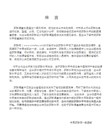
美国心理学会 American Psychological Association(APA)
美国整型外科医师协会 American Society of Plastic Surgeons
美国脊髓损伤协会 American spinal injury association (ASIA)
性慾初发期 appetitive phase
应用行为分析 applied behavior analysis
评估 appraisal
言语失用症 apraxia of speech, verbal dyspraxia
性向测验 aptitude test
独断推论、武断推论 arbitrary inference
3 -甲氧基-4羥基3-methoxy-4-hydroxy phenylglycol (MHPG)
5-羥色胺酸5-hydroxindoleacetic acid (5-HIAA)
5-氢氧靛基醋酸(5TH的代谢物) 5-hydroxyindoleacetic acid (5-HIAA)
匿名者戒酒协会AA (Alcoholics Anonymous)
酒精使用 alcohol use
酒精成癮者 alcoholics
酗酒 alcoholism
阿德勒 Alder, Alfred
治疗者期望效应 allegiance effect
对偶(基因) alleles
过敏性鼻炎 allergic rhinitis
过敏 allergy
治疗同盟 alliance
复本信度 alternate-form reliability
中英文心理学名词对照表
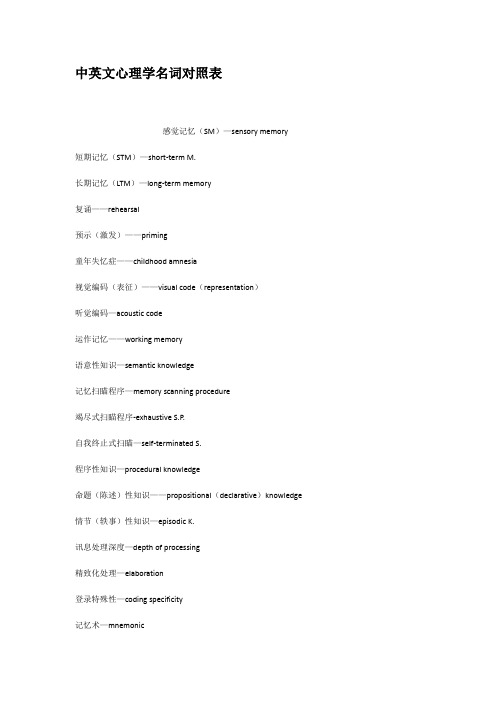
中英文心理学名词对照表感觉记忆(SM)—sensory memory短期记忆(STM)—short-term M.长期记忆(LTM)—long-term memory复诵——rehearsal预示(激发)——priming童年失忆症——childhood amnesia视觉编码(表征)——visual code(representation)听觉编码—acoustic code运作记忆——working memory语意性知识—semantic knowledge记忆扫瞄程序—memory scanning procedure竭尽式扫瞄程序-exhaustive S.P.自我终止式扫瞄—self-terminated S.程序性知识—procedural knowledge命题(陈述)性知识——propositional(declarative)knowledge 情节(轶事)性知识—episodic K.讯息处理深度—depth of processing精致化处理—elaboration登录特殊性—coding specificity记忆术—mnemonic位置记忆法—method of loci字钩法—peg word(线)探索(测)(激发)字—prime关键词——key word命题思考——propositional thought心像思考——imaginal thought行动思考——motoric thought概念——concept原型——prototype属性——property特征——feature范例策略——exemplar strategy语言相对性(假说)—linguistic relativity th.音素——phoneme词素——morpheme(字词的)外延与内涵意义—denotative & connotative meaning (句子的)表层与深层结构—surface & deep structure语意分析法——semantic differential全句语言—holophrastic speech过度延伸——over-extension电报式语言—telegraphic speech关键期——critical period差异减缩法——difference reduction方法目的分析——means-ends analysis倒推——working backward动机——motive自由意志——free will决定论——determinism本能——instinct种属特有行为——species specific驱力——drive诱因——incentive驱力减低说——drive reduction th.恒定状态(作用)—homeostasis原级与次级动机—primary & secondary M. 功能独立—functional autonomy下视丘侧部(LH)—lateral hypothalamus脂肪细胞说——fat-cell theory.下视丘腹中部(VMH)—ventromedial H定点论——set point th.CCK———胆囊调节激素第一性征——primary sex characteristic第二性征——secondary sex characteristic自我效能期望—self-efficiency expectancy内在(发)动机—intrinsic motive外在(衍)动机—extrinsic motive成就需求——N. achievement需求层级—hierarchy of needs自我实现——self actualization冲突——conflict多项仪——polygraph肤电反应——GSR(认知)评估——(cognitive appraisal)脸部回馈假说——facial feedback hypothesis (生理)激发——arousal挫折-攻击假说——frustration-aggression hy.替代学习——vicarious learning短期记忆(STM)—short-term M.长期记忆(LTM)—long-term memory复诵——rehearsal预示(激发)——priming童年失忆症——childhood amnesia视觉编码(表征)——visual code(representation)听觉编码—acoustic code运作记忆——working memory语意性知识—semantic knowledge记忆扫瞄程序—memory scanning procedure竭尽式扫瞄程序-exhaustive S.P.自我终止式扫瞄—self-terminated S.程序性知识—procedural knowledge命题(陈述)性知识——propositional(declarative)knowledge 情节(轶事)性知识—episodic K.讯息处理深度—depth of processing精致化处理—elaboration登录特殊性—coding specificity记忆术—mnemonic位置记忆法—method of loci字钩法—peg word(线)探索(测)(激发)字—prime关键词——key word命题思考——propositional thought心像思考——imaginal thought行动思考——motoric thought概念——concept原型——prototype属性——property特征——feature范例策略——exemplar strategy语言相对性(假说)—linguistic relativity th.音素——phoneme词素——morpheme(字词的)外延与内涵意义—denotative & connotative meaning (句子的)表层与深层结构—surface & deep structure语意分析法——semantic differential全句语言—holophrastic speech过度延伸——over-extension电报式语言—telegraphic speech关键期——critical period差异减缩法——difference reduction方法目的分析——means-ends analysis倒推——working backward动机——motive自由意志——free will决定论——determinism本能——instinct种属特有行为——species specific驱力——drive诱因——incentive驱力减低说——drive reduction th.恒定状态(作用)—homeostasis原级与次级动机—primary & secondary M. 功能独立—functional autonomy下视丘侧部(LH)—lateral hypothalamus脂肪细胞说——fat-cell theory.下视丘腹中部(VMH)—ventromedial H定点论——set point th.CCK———胆囊调节激素第一性征——primary sex characteristic第二性征——secondary sex characteristic自我效能期望—self-efficiency expectancy内在(发)动机—intrinsic motive外在(衍)动机—extrinsic motive成就需求——N. achievement需求层级—hierarchy of needs自我实现——self actualization冲突——conflict多项仪——polygraph肤电反应——GSR(认知)评估——(cognitive appraisal)脸部回馈假说——facial feedback hypothesis(生理)激发——arousal挫折-攻击假说——frustration-aggression hy.替代学习——vicarious learning 发展——development先天——nature后天——nurture成熟——maturation(视觉)偏好法——preferential method习惯法——habituation视觉悬崖——visual cliff剥夺或丰富(环境)——deprivation or enrichment of env. 基模——schema同化——assimilation调适——accommodation平衡——equilibrium感觉动作期——sensorimotor stage物体永久性——objective permanence运思前期——preoperational st.保留概念——conservation道德现实主义——moral realism具体运思期——concrete operational形式运思期——formal operational st.前俗例道德——pre-conventional moral俗例道德——conventional moral超俗例道德——post-conventional moral 气质——temperament依附——attachment性别认定——gender identity性别配合——sex typing性蕾期——phallic stage恋亲冲突—Oedipal conflict认同——identification社会学习——social learning情结——complex性别恒定——gender constancy青年期——adolescence青春期——-puberty第二性征——secondary sex characteristics 认同危机——identity crisis定向统合——identity achievement早闭型统合——foreclosure未定型统合——moratorium迷失型统合——identity diffusion传承——generativity心理动力——psycho-dynamics心理分析——psychoanalysis行为论——behaviorism心理生物观——psycho-biological perspective 认知——cognition临床心理学家-clinical psychologist谘商——counseling人因工程——human factor engineering组织——organization潜意识——unconsciousness完形心理学——Gestalt psychology感觉——sensation知觉——perception实验法——experimental method独变项——independent variable依变项——dependent V.控制变项——control V.生理——physiology条件化——conditioning学习——learning比较心理学——comparative psy.发展——development社会心理学——social psy.人格——personality心理计量学—psychometrics受试(者)——subject 实验者预期效应—experimenter expectancy effect双盲法——double—blind实地实验——field experiment相关——correlation调查——survey访谈——interview个案研究——case study观察——observation心理测验——psychological test纹理递变度——texture gradient注意——attention物体的组群——grouping of object型态辨识—pattern recognition形象-背景——figure-ground接近律——proximity相似律——similarity闭合律——closure连续律——continuity对称律——symmetry错觉——illusion幻觉——delusion恒常性——constancy大小——size形状——shape位置——location单眼线索——monocular cue线性透视——linear- perspective 双眼线索——binocular cue深度——depth调节作用——accommodation 重迭——superposition双眼融合——binocular fusion 辐辏作用——convergence双眼像差——binocular disparity 向度——dimension自动效应——autokinetic effect 运动视差——motion parallax诱发运动——induced motion闪光运动——stroboscopic motion上下文、脉络-context人工智能——artificial intelligence A.I.脉络关系作用-context effect模板匹配——template matching整合分析法——analysis-by-synthesis丰富性——redundancy选择性——selective无意识的推论-unconscious inferences运动后效——motion aftereffect特征侦测器—feature detector激发性——excitatory抑制性——inhibitory几何子——geons由上而下处理—up-down process由下而上处理——bottom-up process连结者模式——connectionist model联结失识症——associative agnosia脸孔辨识困难症——prosopagnosia意识——conscious(ness)意识改变状态——altered states of consciousness无意识——unconsciousness前意识——preconsciousness内省法——introspection边缘注意——peripheral attention多重人格——multiple personality午餐排队(鸡尾酒会)效应—lunch line(cocktail party)effect 自动化历程——automatic process解离——dissociate解离认同失常——dissociative identity disorder快速眼动睡眠——REM dream非快速眼动睡眠—NREM dream失眠——insomnia显性与隐性梦——manifest & latern content心理活动性psychoactive冥想——meditation抗药性——tolerance戒断——withdrawal感觉剥夺——sensory deprivation物质滥用——substance abuse成瘾——physical addiction物质依赖——sub. dependence戒断症状——withdrawal symptom兴奋剂——stimulant幻觉(迷幻)剂——hallucinogen镇定剂——sedative抑制剂——depressant酒精中毒引起谵妄—delirium tremens 麻醉剂——narcotic催眠——hypnosis催眠后暗示——posthypnotic suggestion催眠后失忆posthypnotic amnesia超心理学——parapsychology超感知觉extrasensory perception ESP心电感应——telepathy超感视——clairvoyance预知——precognition心理动力—psycokinesis PK受纳器——receptor绝对阈——absolute threshold差异阈——difference threshold恰辨差——-JND韦伯律——Weber''s law心理物理——psychophysical费雪纳定律——Fechner''s law 频率——frequency振幅——amplitude音频——pitch基音——fundamental tone倍音——overtone和谐音——harmonic音色——timbre白色噪音——white noise鼓膜——eardrum耳蜗——cochlea卵形窗—oval window圆形窗——round window前庭——vestibular sacs半规管——semicircular canals角膜——cornea水晶体——lens虹膜——iris瞳孔——pupil网膜——retina睫状肌——ciliary muscle调节作用——accommodation脊髓——spinal cord反射弧——reflex arc脑干——brain stem计算机轴性线断层扫描——CAT或CT PET——正子放射断层摄影MRI——磁共振显影延脑——medulla桥脑——pons小脑——cerebellum网状结构——reticular formation RAS——网状活化系统视丘——thalamus下视丘——hypothalamus大脑——cerebrum脑(下)垂体(腺)—pituitary gland 脑半球——cerebral hemisphere皮质——cortex胼胝体——corpus callosum边缘系统——limbic system海马体——hippocampus杏仁核——amygdala中央沟——central fissure侧沟——lateral fissure脑叶——lobe同卵双生子——identical twins异卵双生子—fraternal twins古典制约——classical conditioning操作制约——operant conditioning非制约刺激—(US unconditioned stimulus 非制约反应—(UR)unconditioned R.制约刺激——(CS)conditioned S.制约反应——(CR)conditioned R.习(获)得——acquisition增强作用——reinforcement消除(弱)——extinction自(发性)然恢复——spontaneous recovery 前行制约—forward conditioning同时制约——simultaneous conditioning回溯制约——backward cond.痕迹制约——trace conditioning延宕制约—delay conditioning类化(梯度)——generalization(gradient)区辨——discrimination(次级)增强物——(secondary)reinforcer嫌恶刺激——aversive stimulus试误学习——trial and error learning效果率——law of effect正(负)性增强物—positive(negative)rei.行为塑造—behavior shaping循序渐进——successive approximation自行塑造—autoshaping部分(连续)增强—partial(continuous)R定比(时)时制—fixed ratio(interval)schedule FR或FI变化比率(时距)时制—variable ratio(interval)schedule VR或VI 逃离反应——escape R.回避反应—avoidance response习得无助——learned helplessness顿悟——insight学习心向—learning set隐内(潜在)学习——latent learning认知地图——cognitive map生理回馈——biofeedback敏感递减法-systematic desensitization普里迈克原则—Premack''s principle洪水法——flooding观察学习——observational learning动物行为学——ethology敏感化—sensitization习惯化——habituation联结——association认知学习——cognitional L.观察学习——observational L.登录、编码——encoding保留、储存——retention提取——retrieval回忆——(free recall全现心像、照相式记忆——eidetic imagery、photographic memory . 舌尖现象(TOT)—tip of tongue再认——recognition再学习——relearning节省分数——savings外显与内隐记忆——explicit & implicit memory记忆广度——memory span组集——chunk序列位置效应——serial position effect起始效应——primacy effect新近效应——recency effect心(情)境依赖学习——state-dependent L.无意义音节—nonsense syllable顺向干扰——proactive interference逆向干扰——retroactive interference闪光灯记忆——flashbulb memory动机性遗忘——motivated forgetting器质性失忆症—organic amnesia阿兹海默症——Alzheimer''s disease近事(顺向)失忆症—anterograde amnesia旧事(逆向)失忆—retrograde A.高沙可夫症候群—korsakoff''s syndrome 凝固理论—consolidation。
- 1、下载文档前请自行甄别文档内容的完整性,平台不提供额外的编辑、内容补充、找答案等附加服务。
- 2、"仅部分预览"的文档,不可在线预览部分如存在完整性等问题,可反馈申请退款(可完整预览的文档不适用该条件!)。
- 3、如文档侵犯您的权益,请联系客服反馈,我们会尽快为您处理(人工客服工作时间:9:00-18:30)。
A.阿德勒Adler, Alfer阿尔兹海默病Alzheimer's disease阿芬那留斯Avenarius,Richard阿赫Ach, Narziss阿吉里斯Argyris, Chris阿奎那Aquinas,Thomas阿伦森Aronson, Elliot阿尼玛Anima阿尼姆斯Animus阿普加量表Apgar scale阿斯贝格症候群Asperger syndrome阿希Asch, Solomon Elliott埃里克森Erikson, Erik Homburger埃里克森的人格发展阶段理论Erikson's stage theory of personality development 埃斯蒂斯Estes,William Kaye埃文斯Avans,Richard艾宾浩斯Ebbinghaus, Hermann艾森克人格问卷Eysenck personality questionnaire,EPQ艾氏测验Ebbinghaus test爱的三角triangle of love爱德华兹个人爱好测验Edwards personal preference schedule,EPPS爱尔维修Helvetius ,Claude Adrien爱好preference爱情love爱情三角理论Triangular theory of love 爱童症pedophilia安德森Anderson, John Richard安吉尔Angell, James Rowland安全感security安全心理学安全需要安全依恋安慰剂安慰剂效应按捺稍后提问法暗示暗示疗法暗示性暗视觉暗适应暗适应曲线暗影奥尔波特(F.H.奥尔波特)奥尔波特(G.W.奥尔波特)奥尔比森错觉奥古斯丁奥卡姆的剃刀奥苏贝尔B.巴宾斯坦反射巴甫洛夫条件作用巴纳姆效应白板说白鲁勒白日梦白箱白噪音白质百分等级百分量表百分位数班达完型测验班杜拉班杜拉的人格理论班集体气氛半规管半乳糖血症帮团时期棒框测验棒框仪包含过多包容需要保持过程保持曲线保持性复述保健因子报酬报告标准抱负水平鲍尔暴力行为暴露疗法暴死贝尔贝尔-马龙第定律贝克哈特的组织健康模型贝克莱贝利婴儿发展量表贝内特机械理解测验贝努里贝努里试验贝叶斯定理贝叶斯判别备课备择假设背景效应背景智力背诵被动触觉被动练习被洞悉感被害妄想被试被试变量被试间设计被试内设计被试亡失被试样本被试总体被预测变量本顿视觉认知测验本能本能论本体感受本土研究本我苯丙酮尿症比较比较刺激比较方法比较分析法比较判断比较判断定律比较水平比较心理学比较语言分析比例量表比率差异显著性检验比率取样比率显著性检验比率智商比奈比奈量表比-西智力量表必然事件毕生发展观闭合律闭锁性闭锁性运动技能避败型学生边缘型人格障碍边缘系统边缘智力边缘主义编码编序记时仪编序时距控制器变革型领导变革型领导理论变革者变量变式变态反应变态心理学变异变异刺激变异量数变异性变异指数辨别差异辨别反应辨别反应时辨别时间辨别学习辩证思维标的社会图彪勒(C.B.彪勒)彪勒(K.彪勒)标记奖励法标签理论标签效应标准参照测验标准差标准刺激标准分数标准化标准化测验标准化成就测验标准化访谈标准化回归系数标准化因径系数标准回归方程标准九标准十标准文化比较样本标准误标准正态分布表层结构表面特质表面效度表情表情性人格障碍表现法表现性艺术表象表象系统或内在模式表象性思维表型复制表演游戏表征冰山剖面图濒死并存变量并行加工并行搜索并行学习病理性赘述病理性醉酒病人和治疗者变量策略病态赌博病态人格波利阿纳机制波利阿纳原则波林波特和劳勒的激励综合模型剥削式独裁领导柏格森柏拉图补偿补偿说补色律不等同对照组设计不公平关系不可能图形不可能事件不可逆性不确定间距不确定性不随意肌不随意想象不随意性不随意运动不随意注意不同文化多维智力评鉴不协调不一般效应不一致态度改变布朗布雷德布里奇曼布鲁姆布鲁纳布伦塔诺布罗卡布罗卡区布罗卡失语症部分报告法部分强化部分团体形成期部门化部位记号说C.“猜是谁”技术才能蔡戈尼克效应参数参数估计参数检验参与参与改变态度的理论参与观察参与管理参与领导参与者的观察参照测量参照测量法参照点参照记忆参照权力参照群体参照群体改变态度的理论参照群体理论参照群体认同参照系残余型精神分裂症操作测验操作量表操作条件作用操作行为主义操作性对立假设操作性虚无假设操作性定义操作性条件作用学习论操作性行为操作学习论操作主义侧向思维方法侧抑制测谎量表测谎器测量测量标准误测量操作性定义测量误差测量型数据测验测验法测验焦虑测验年龄测验偏向测验手册测验数据测验项目层次观层次聚类法层次网络模型层面理论差别感受性差别阈限差异阈限法差异标准误差异量数差异系数差异显著性检验差异心理学差音产品型结构产生式理论产生式系统长期交往长时记忆尝试研究常规决策理论常模常模参照测验常模参照分数常模团体场地社会测量法场动力论场独立场独立型场依存场依存性场依存与场独立超Y理论超常儿童超凡魅力超感知觉超个人心理学超级目标超价值观念超脱型超我超心理学超越性领导超越型领导理论超越性动机超载模陈述性记忆陈述性知识成本最小化战略成对联合法成分智力成功恐惧成就测验成就动机成就动机模型成就商数成就需要成年礼成人成人感成人后期成人期成人早期成人中期成熟成熟模式成束假设成套测验成员领袖分析成长动机成长研究成长咨询呈现数字或字母开头的词目I型错误type I errorⅡ型错误typeⅡerror360º绩效评估360º performance evaluationA-B-X模式A-B-X modelA反应A-reactionA式管理A managementA型行为模式type A behavior patternA型性格type A personalityB反应B-reactionB型行为模式type B behavior patternB 型性格type B personalityCIE1931 色度图CIE 1931 chromaticity diagramC 反应C-reactionC分数C scoreDSM-IV 和ICD-10的人格障碍分类personality disorders classification of DSM -IV and ICD-10ERG 理论ERG theoryF 分布F distributionF检验F testJ 式管理J managementKappa 效应Kappa effectPM领导行为理论PM theoryQ 方法论Q methodologyQ 分类Q sortingQ 技术Q techniqueROC曲线ROC curveR方法论R methodologyR技术R techniqueSCA 理论SCA theorySOR 定律stimulus-organism-response lawSRA机械概念测验SRA test of mechanical concept SR 刺激反应心理学stimulus-response psychology Tau 效应Tau effectTOTE 单元test-operate-test-exitt 分布t-distributionT分数T scoret 体检t-testT小组T-groupT小组讨论T-group sessionT形迷津T-mazeXYY 症候群XYY syndromeX理论theory XY-G性格测验量表Yatabe-Gil-ford testY理论theory YY型沟通网络Y communication networkY型迷津Y mazeZ分数Z-scoreZ检验Z testZ理论Z theoryZ式管理Z managementα波alpha waveα水平alpha levelα因子法alpha factoring method θ波theta waveΦ 系数phi coefficientΦ 现象phi phenomenanx2 分布Chi-square distribution x2合成composition of Chisquares x2 检验Chi-square testx2可加性additivity of Chisquare。
